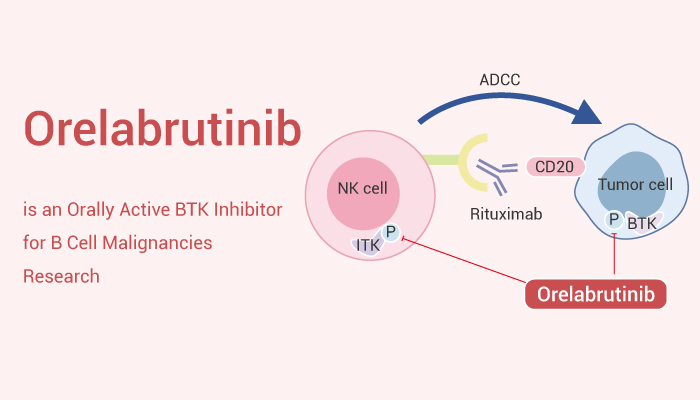B cell lymphoma is a kind of non-Hodgkin lymphoma (NHL) and comprises a diverse group of malignant diseases. However, about 1/3 patients with B-NHL developed relapsed or refractory diseases. Bruton tyrosine kinase (BTK) is an important regulator of B cell receptor (BCR) signaling pathway. Chronic and sustained activation of the BCR signaling pathway is related to the pathogenesis of many subtypes of B cell malignancies.
The first-generation BTK inhibitor is ibrutinib with remarkable efficacy in several hematological malignancies. However, the off-target inhibition of ibrutinib on interleukin-2 (IL-2)-inducible T cell kinase (ITK) may reduce rituximab’s antibody-dependent cellular cytotoxicity (ADCC) efficacy. Today, we will introduce a high selectivity BTK inhibitor– Orelabrutinib (Orel).
Orelabrutinib (ICP-022) is a newly developed BTK inhibitor with high selectivity.
Orelabrutinib (ICP-022) is a potent, orally active, and irreversible BTK inhibitor with potential antineoplastic activity. First of all, Orelabrutinib has significant BTK inhibition activity with an IC50 at 1.6 nM. And Orelabrutinib has superior kinase selectivity. When performed at 1 μM against a panel of 456 kinases, Orelabrutinib only targeted BTK with >90% inhibition lacking inhibition on many additional kinases, including EGFR, TEC, and bone marrow tyrosine kinase. Second, Orelabrutinib prevents both the activation of the BCR signaling pathway and BTK-mediated activation of downstream survival pathways, inhibiting the growth of malignant B-cells that overexpress BTK. Meanwhile, Orelabrutinib achieves high bioavailability comparing to other BTK inhibitors.
Finally, Orelabrutinib (once daily) has excellent safety profiles in phase I study. And in preclinical models that Orelabrutinib in combination with rituximab could preserve NK-cell-mediated ADCC induced by rituximab and enhanced the apoptosis of tumor cells in vitro.
Reference:
[1] Yu H, et al. Mol Ther Oncolytics. 2021 Apr 3;21:158-170.
[2] Wei Xu, et al. Blood (2019) 134 (Supplement_1): 4319.
